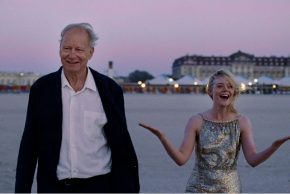Article: Anna Rácz
Translation: Nóra Fehér
Imagine a premiere where the audience is screaming in outrage, throwing stink bombs, and the noise they make is so loud that the orchestra can’t be heard. This is what we would have seen and heard if we had entered the Cologne Opera House in 1926 for the premiere of The Miraculous Mandarin. The mayor of the city even demanded the resignation of the Hungarian conductor Jenő Szenkár, who conducted Béla Bartók’s work at the premiere. Bartók, however, was not embarrassed, went to the conductor’s dressing room and said gently:
“Jenő, on page thirty-four I have written a mezzo for the second clarinet. Few. Please make it forte.”
Perhaps this story is a testament to our great composer’s self-righteousness, his relentlessness and his constant desire to innovate. At the Bartók Spring International Art Weeks, Concerto Budapest and Dénes Várjon will evoke Bartók’s unique musical world. The concerts will also be a challenge for them, as the Kossuth Prize-winning pianist will play the Piano Concerto No. 2 for the first time. Dénes Várjon’s playing is at once free and rich in gestures, emotions and emotions, yet every detail of the solo is meticulously worked out, the rhythm is precise, and the image of the work is sharp. We talked to him.
Has your relationship with Bartók changed during your career as a pianist?
Bartók has always been very important to me, but in the last twenty years he has become one of the most important composers for me, so in that sense it’s more a question of constancy. However, within that, he is also constantly changing, which is why I waited until now to perform the Piano Concerto No. 2 on 12 April, the second concert in our series. I will be playing this work for the first time, and I feel that the wait was a good decision, and that I am now perhaps mature enough to do so. In addition to his music, it has always been extremely important to me to listen to the recordings on which he plays the piano.
How do you remember your first encounter with Béla Bartók’s works?
I was first introduced to his works Mikrokosmos and For Children at music school. In retrospect, it is interesting and perhaps understandable that as a child I was not so fond of Mikrokosmos, whereas I was a fan of the movements of For Children.
What was the reason for this?
Very simply put, Mikrokosmos didn’t feel so ‘pretty’, whereas the folk song arrangements in the For Children series were immediately close to me. This is changing, because Microkosmos has since become a great favourite of mine. The richness and maturity of her music is captivating, and the treasures beyond her pedagogical intentions are illuminated by her performance style. Bartók was an amazing pianist, and I think that knowledge of his playing is essential to understanding his music, and I don’t just mean his own works. It is an incredible experience to watch how he approaches a Chopin piece, or works by Brahms, Debussy, Beethoven, Kodály. Beethoven’s Kreutzer Sonata, performed with József Szigeti in Washington, is for me the most impressive Beethoven recording.
Bartók was a powerful personality and a major innovator. Are these musical innovations to be found in the works on your programme?
Certainly, with the Piano Concerto No. 2. The third was written towards the end of his life, for his wife, and in the second movement there is a very strong Beethoven influence. What’s fantastic about Bartók is that he has a language that is like no one else’s, but at the same time it is completely embedded in European culture and the history of music. It goes all the way back to the music of Bach and, in fact, it is on this Bach-Beethoven line that it is fulfilled. He has been influenced by many different things, but he has developed a language all his own, which opens the way to the future. He was clearly an innovator, but you could always sense the roots and the evolutionary process in which he was situated.
Was it the Beethoven influence that led you to choose Beethoven’s Symphony No. 5 in C minor, “Fate”, which will also be performed at 7 April?
Yes, the programme was put together by my friend András Keller, music director of Concerto Budapest, who is also the conductor of the concerts. I fully agree with his choice, and what is also special about Bartók is that it can be edited quite exceptionally well with other composers. Of course, it also stands up very well on its own, so I think it’s a great experience to listen to a complete Bartók evening, because as you get deeper into his music you can discover incredible differences. There is an extremely strong, independent character to his pieces. At the same time, it’s great to pair it with other composers, whether Haydn, Mozart, Liszt or Strauss, and you can tell that many composers are very comfortable in the company of Bartók’s works. It can even be paired with Chopin’s mazurkas, which is exciting because you can see its folkloric flavours.
Bartók knew no compromise. Do you have to compromise when performing his works?
I think that we serve the performance together with the orchestra. Of course, there is always a compromise, because even the best performance is an attempt, that is to say, we try to live up to the piece. When I occasionally play with composer friends their own works, it’s interesting to observe that they are searching in the same way, trying to find the best moment, despite being the composer of the work. I think that the whole orchestra, András as conductor and myself as soloist, together we are trying to create something, together we will do our best to make it as authentic a performance as possible.
Playing Bartók with Concerto Budapest already seems to be a tried and tested collaboration. Is this a well-knit team?
For many years we have had many performances and shared experiences together. We also have recordings of the five Beethoven piano concertos. András Keller has been a close friend of mine for a long time and one of my most important chamber musicians, with whom we have played together in many formations.
What is your experience of Bartók’s music, is it accessible to today’s concert audiences? What feedback do you get when you play his works?
I very much hope so, but I also think that we certainly have a lot of work to do to achieve this. It’s interesting that when I was a child, I had a very different image of Bartók, and that image has been imprinted on people in general. I too heard that it was perhaps not so beautiful, sometimes even mechanical, so that we were not really aware of exactly what Bartók’s music was all about. It made a huge difference when you could hear his works performed by him. His incredible and uncompromisingly stubborn attitude, but also the infinite freedom he is able to give while writing everything down to the millimetre. There is always a lifelike quality to his playing, everything he communicates is extremely precise, but never ‘mechanically’, the whole work happens, and one realises that in this very detailed notation he has also tried to record as precisely as possible the workings and laws of the freedom of matter.
Does this method also give freedom to the performer?
Yes, one is trying to get to know the language as well as possible, and this gives a great deal of freedom. One can now position oneself well within the language one has learned and search within it. That is why the aforementioned speech-like and temporal quality is important, in fact the material must be breathed and grasped at the same time. It is an incredibly concentrated force that we are talking about here. There’s always a great discipline to it, but it’s not a discipline that constrains, it’s precisely through this that the volcanic, lava-like drifting force that characterised his personality can show itself. There is an inexpressible sensitivity in his pieces, with serious mental and emotional content that takes the listener into wonderful spheres, and I was not at all aware of this as a child, for example, and discovered it as an adult. The sensitivity with which he perceives the sounds of the elements, for example, and the meaning that they convey in his works is extraordinary.
Thinking back to your previous concerts of Bartók, what makes the April concerts unique?
For me, they are definitely special because performing the Piano Concerto No. 2 is a big undertaking on my part. It’s also important because it’s the first of two concerts in a complete series of works by Bartók for piano and orchestra, which will continue next year. This will give me the opportunity to explore these wonderful pieces in greater depth.
Speaking of folklore, are there any signs of Bartók’s commitment to folk music in the pieces that are included in the concert programme?
Every moment, even when you’re not using folk music. The absolutely fantastic quality of your playing, which is almost the first thing that comes to mind, is that you are always speech-like and have a fantastic way with time. This speech-like quality means that Bartók narrates everything and everything has to do with language. The slope of language, the rhythm, the form, the diction, and that is something incredibly interesting.
Article: Anna Rácz
Translation: Nóra Fehér

























Comments